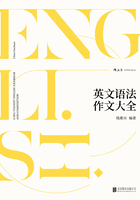
(22)动词的时态
表示动作和状态之时的动词的形式,就叫作时态(Tense)。在英语中一共有十二种不同的时态,如下表:
Primary Tenses (常态) |
Progressive (进行) |
Perfect (完成) |
Perfect Progressive (完成进行) |
|
Present (现在) |
I do |
I am doing |
I have done |
I have been doing |
Past (过去) |
I did |
I was doing |
I had done |
I had been doing |
Future (将来) |
I shall do |
I shall be doing |
I shall have done |
I shall have been doing |
但动词 to be,是没有进行式和 Passive 的,现将其时态及三种人称举出如下:
(单数) |
(复数) |
||
Primary |
Present |
(第一人称)I am (第二人称)You are (第三人称)He is |
We are You are They are |
Past |
(第一人称)I was (第二人称)You were (第三人称)He was |
We were You were They were |
|
Future |
(第一人称)I shall be (第二人称)You will be (第三人称)He will be |
We shall be You will be They will be |
|
Perfect |
Present |
(第一人称)I have been (第二人称)You have been (第三人称)He has been |
We have been You have been They have been |
Past |
(第一人称)I had been (第二人称)You had been (第三人称)He had been |
We had been You had been They had been |
|
Future |
(第一人称)I shall have been (第二人称)You will have been (第三人称)He will have been |
We shall have been You will have been They will have been |
1. PRESENT(现在)
①Present Tense 是用 Verb 的 Root-form(原形),不过在第三人称单数的时候,要加 s 或 es。
The flowers fall. 花落。
He goes to school. 他上学。
②Present Tense 的用法。
a. 表示现在的动作(present action)。
I see a ship in the distance. 我看见远处有一只船。
〔注〕表示现在的动作,多用现在进行时。
b. 表示习惯的动作(habitual action)。
I always play baseball in the afternoon. 我常在下午打棒球。(个人的习惯)
He keeps his promise. 他是守约的。(人格)
He deals in earthenwares. 他做陶器生意。(职业)
c. 表示一般的真理(general truth)。
The sun shines by day and the moon by night. 白天有阳光照耀夜里有月光照亮。
d. 代替将来时(Future Tense)用。常在 go,come,leave,start 等动词连有未来的副词时。
The steamer leaves here tomorrow. 轮船明日离此。
e. 在以 if、when、while、before、after、till 等连词引导的条件句,或表时的副词从句中,以现在代未来。
We shall not go out if it rains tomorrow. 明天下雨的话,我们就不出去。
Please wait till I come back. 请等我回来。
〔注一〕如果这个副词从句是表示“意志”的话,仍然要用 will。即“I shall be glad if you will do so. ”(如果你肯这样做,我就高兴了)。
〔注二〕如果不是副词从句,而是名词从句时,也仍然要用将来的时态,即“Let us inquire if he will go today. ”(问问他今天是不是要去)。
f. 代替过去时(Past Tense)用。这是要使读者产生活生生的感觉,故用现在动词,仿佛目前发生的事情一样。又称历史现在时(Historical Present)。
Caesar leaves Gaul,crosses the Rubicon,and enters Italy with 5,000 men. 恺撒率五千之众,由高卢出发,渡过泸河,进入了意大利。
g. 代替现在完成时(Present Perfect)用。
I hear(= have heard)she is going to marry. 听说她要结婚了。
I read(= have read)in the newspapers that he has been elected Mayor of Tainan. 我在报上看到他被选为台南市长了。
2. PRESENT PROGRESSIVE(现在进行)
① 表示正在进行中的事。
He is now teaching English in the next room. 他现正在隔壁的教室教着英文。
〔比较〕He teaches English in that school. 他在那个学校教英文(用现在时态表示他的职业)。
② 与未来的副词同用,表示未来及预定之意。常用 go、come、leave、start、stay 等动词的进行时。
He is going(= will go)to America next month. 他下月赴美。
Are you staying(= Will you stay)here till next week?你将停留到下星期才走吧?
比较: |
I go to school every day.(习惯的行动) I am going to school now.(动作的进行中) I am going to school now.(动作的进行中) |
③ 用 to be going + Infinitive 的形式,表示最近未来想要做的事。
I am going to start for Europe. 我正打算动身到欧洲去。
I am just going to advise him to go out for a walk. 我正预备劝他出去散步一回。
比较: |
He writes well. 他文章写得好。(现在) He is writing a letter. 他正在写信。(进行的现在) He is writing a letter. 他正在写信。(进行的现在) |
④ 用 Present Tense 来表示现在正进行的动作或状态。因为 have、resemble、like、see、hear、remember、need、understand、possess、belong 等词,是没有进行时的。“我有钱”,只消说“I have money. ”就行了,不可以说“I am having money. ”“我只认识他的面孔”应说“I know him only by sight. ”不可说“I am knowing him only by sight. ”其他如“He has a good constitution. ”(他体格很好。)“He closely resembles his father.”(他很像他父亲。)也都是如此。试比较下列各句:
I see something white in the distance.
I am looking at the sky.
I hear him singing.
He is listening to the music.
He has no money with him now.
They are having a jolly time.
We are having a terrible hot summer.
He is having his supper.
〔注一〕因 see 无进行时,要表示正在看,只能说 be looking at。同样地要用 be listening to 代替 hear。
〔注二〕动词 have 作“有”解时,没有进行式,用作进行式时必另有含义,如 have jolly time(玩得很快乐),have a terrible hot summer(今夏酷热),have one’s supper(在吃晚饭)等。
3. PAST(过去)
① 表示过去的动作或状态。
We met him at the station.(动作)
We were there all summer.(状态)
② 表示过去一种习惯的动作。
He used to sit every day under that tree. 他从前老是每天坐在那棵树下。
He would spend whole hours in examining its various parts. 他老是要花好几个钟头来检查各部分。
〔注〕以 would 表过去的习惯时,多与 often、sometimes 等副词同用。
4. PAST PROGRESSIVE(过去进行)
表示过去某个指定的时候所发生的进行中的动作。
Once two men were traveling together. 从前有两个男子正在一块儿旅行中。
I was reading a novel when you came. 你来时我正在读着一本小说。
5. FUTURE(未来)
表示未来有下列种种形式。
I shall go to Tainan.
I am going to Tainan.
I am going to leave Taipei.
I am about to leave Taipei.
I am to go to Tainan.
6. FUTURE PROGRESSIVE(将来进行)
表示未来某个指定的时候将发生的进行中的动作。
He is much interested in reading that book. He will be still reading it if you look in at his room.
他对那本书很感兴趣。你到他房里去看看,他仍然还抱着那本书在读着。
7. PRESENT PERFECT(现在完成)
现在完成有下列种种用法。
①表示到目下刚完成的事。
I have just written this letter. 我刚把这信写完了。
②表示动作已完,其结果则成为现在的状态。
He has gone to Taipei.(= He is not here. He is in Taipei now.)他到台北去了。
③表示过去的经验。
I have seen him before. 我以前见到过他。
④表示继续到现在为止的状态。
He has been ill since last Monday. 他自上星期一以来就生病了。
8. PRESENT PERFECT PROGRESSIVE(现在完成进行)
表示从过去到现在,也许还要继续到将来的动作。
What have you been doing all this while?你这一晌在做些什么呀?
I have been studying English for five years.(继续)
I have studied English for five years.(经验)
〔注〕have been studying 表示过去学了,现在正在学,将来还要学。
9. PAST PERFECT(过去完成)
表示过去某个指定的时候以前所发生的事。
They had known each other before they got married. 他们在结婚以前早就相知有素了。
比较: |
1. He borrowed the book and returned it. 2. He returned the book that he had borrowed. |
〔注〕如第一句,照动作的顺序排列,即先借后还,就可用 Past,但如第二句,把顺序颠倒,即先说还再说借时,就得用 Past Perfect 了,had borrowed 是表示在 returned 以前发生的动作。
10. PAST PERFECT PROGRESSIVE(过去完成进行)
表示某动作继续到过去的某个时候为止。
I had been waiting about an hour when he came. 我等待了差不多一个钟头他才来。
I had been studying English before I went to bed. 我在就寝以前读了英文。
11. FUTURE PERFECT(将来完成)
表示到未来某个时候为止已经会做好了的事。
I shall have finished it by the time school begins. 在上课以前我就会把它做好的。
注意:在 Adverb Clause 中应以 Present Perfect 来代替 Future Perfect,如 Wait till I have finished eating.(等我吃完饭再说。)
12. FUTURE PERFECT PROGRESSIVE(将来完成进行)
表示继续到未来某个时候为止就要完成的事。
He will have been teaching in this school full ten years(by)next July. 到明年七月,他就在本校足足教了十年的书了。